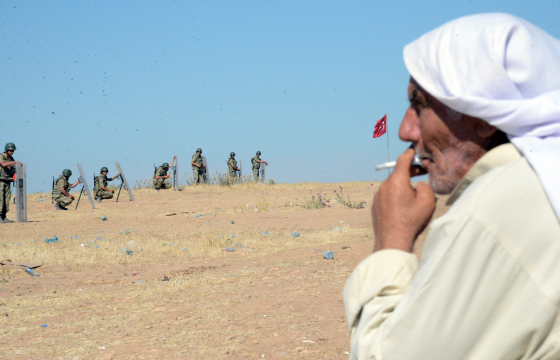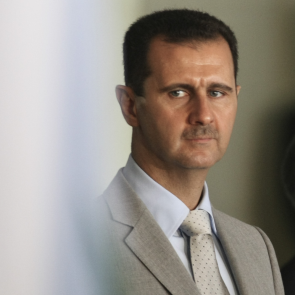Fallout from the Syrian volcano has finally reached Europe. Mass uncontrolled migration and a parallel upsurge of violent jihad – both driven mainly by turmoil in Syria – have the potential to existentially challenge Europe’s cultural identity and its institutional structures.
Europeans are beginning to sense that the latest massacre in Paris and security lock down in Belgium – all routine happenings in Syria – may be a foretaste of a grisly future Europe. Instead of undergoing a European-style “democratic transition” as promised first in 2003 by Bush and Blair, and then again in 2011 by Obama and Cameron, the Middle East is the scene of more death and destruction than at any time since the Golden Horde invaded in the 13th century.
Meanwhile Europe faces an upsurge in destabilising developments emanating from the Middle East.
Syria is currently the geographical epicenter of the expanding global disorder. This was not always so. When President Obama announced his Syrian regime change policy in August 2011, just over 2,000 lives had been lost, according to the UN.
The overwhelming majority of Syrians were then living in their own homes, going to work and school, and living peacefully according to their own religious traditions.
While its prisons were undoubtedly full of cruelly treated political prisoners, Syria’s secular dictatorship was a safe haven for over one million Iraqi refugees fleeing the destructive consequences of Washington’s Operation Iraqi Freedom.
Today, the post-“Arab Spring” death toll in Syria is over 250,000. Half of all 22-million Syrians are displaced. Huge urban centres are now bombed out shells. The Islamic State (IS), al-Qaeda and other jihadist armies dominate the Syrian opposition and control much of northern, eastern and southern Syria.
War victims come from all of Syria’s diverse religious sects. But its Christian community and other non-Sunni minorities are threatened with eradication.
READ MORE ANALYSIS ON THE REFUGEE CRISIS...
Depriving Isis of a home is key to victory - Clifford Longley
US Catholic charities receive hate mail over White House plans to welcome Syrian refugees
The Jungle is no place for the women forced to live there - Sister Lynda Dearlove
Caritas caught out by uncharted waters - Raymond Whitaker
Calais refugees are not wealthy, lucky or strong - Helen O'Brien
Greece braces itself for another wave of refugees - Sean Smith
All rebel-controlled parts of Syria, plus IS-ruled western Iraq, have been religiously cleansed of non-Sunnis.
Four million displaced Syrians have sought refuge abroad. Many now make their way towards Europe, while seven million have found protection behind the lines of Bashar al-Assad’s army.
They include Christians and members of other religious minorities. But most of those fleeing to government controlled territory are Sunni Muslims, in whose name the jihadist wage war.
Soon after the eruption of the Arab Spring uprisings, Washington, London and Paris, together with allied Islamist states – most notably Saudi Arabia, Turkey and Qatar – embarked on a hybrid war against the secular Syrian government, using jihadists as foot soldiers.
The war goal, according to an American MoD intelligence report from August 2012, was to “create a declared or undeclared Salafist principality in eastern Syria”, so as to “isolate the Syrian regime”, and thereby undermine “the strategic depth of the Shia expansion”.
In other words, to erode the influence of Iran.
There is, however, a faint silver lining in the dark clouds hanging over both the Middle East and Europe: The threat to Europe arising from Syrian-driven terrorism and mass migration, combined with Russia’s ramped up military intervention, have prompted Washington and its allies to reassess failed policy.
 Syrians wait at the border to cross into Turkey as the fighting rages on (PA)
Syrians wait at the border to cross into Turkey as the fighting rages on (PA)
US Secretary of State John Kerry reflected new thinking when he recently declared that the Syrian war “has gone on for much too long”.
He now defines Washington’s paramount goals as “ridding the region of” Isis and the restoration of a Syria that is a “secular, unified” county, in which “all minorities are protected”.
Assad’s future, Kerry proposes, should be determined by a peace process involving “all parties”.
Against this background, the Prime Minister, David Cameron, prepares a new British war plan for Syria. Parliament, aided by the Church and civil society, has a responsibility to make sure that the proposed measures will help, and not hinder, a rapid return to peace and stability in Syria.
The plan must encompass vigorous military and political measures against not only the Islamic State, but also the broader jihadist movement from which the Isis has emerged. If left undone, a defeated Isis, will simply morph into a new, possibly more potent institutional structure.
But it is crucial that the war plan is complemented by a credible peace plan. The peace component must demonstrate robust support for the recently resumed UN-sponsored negotiations between the United States and Russia, and their respective allies.
It would be unconscionable if a Syrian peace process were again to be torpedoed by western resumption of the tired old mantra “Assad must go”.
Too much is at stake, for both the Middle East and Europe.<
John Eibner is a Director of Christian Solidarity International (CSI), with responsibility for its Middle East Programme. He travels frequently to Syria and Iraq
KEEP UP TO DATE ON TWITTER AND FACEBOOK...
Follow all the latest news and events from the Catholic world via The Tablet's Twitter feed @the_tablet
Or you can join in the debate at our community page on Facebook




 Loading ...
Loading ...
What do you think?
You can post as a subscriber user ...
User comments (1)
A secular society is probably the best option for us all, not just Syria.